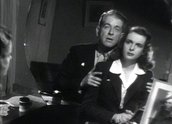

While There is Still Time (1941)
Synopsis
This is a short wartime documentary made by Charles and Elsa Chauvel for the Commonwealth Department of Information (DOI). It encourages Australians at home to work and save to help their loved ones overseas fighting the war. Grace (Dorothy Dickson), bored with her work at the factory, thinks about spending her wages on herself rather than saving for the return of her boyfriend Jim from the war. On receiving a letter from Jim (Peter Finch) – now blind – Grace and her work colleagues are motivated to greater prudence with their money and to work together to assist the war effort.
Curator’s notes
While There is Still Time tells the story of Grace – a worker in a munitions factory – and her boyfriend Jim, who is serving on the frontlines overseas. Her story illustrates that worker absenteeism at home has a negative impact on fighting the war. Grace’s mother condemns her daughter’s self-indulgent desire to spend money on a new hairdo or night out with the girls as the type of attitude which leads to wars in the first place. It is her father who broadens Grace’s perspective. On the other side of the world, soldier Jim is proud of his girlfriend’s efforts and its direct benefit to the troops. Later blinded in battle, he writes to Grace encouraging her to save money 'while there is still time’. Grace shares the inspirational letter with her colleagues in the factory.
The four documentaries that the Chauvels made for the DOI during the Second World War all aimed to raise the morale of people working on the home front: munitions factory workers (see Soldiers Without Uniform, c1941 and While There is Still Time), steel workers and shipbuilders (see A Mountain Goes to Sea, 1943) and coal miners (see Power to Win, 1942). The films combine documentary footage and dramatised segments to present scenarios recognisable to Australian audiences of the time. Chauvel had made Forty Thousand Horsemen in 1940 but, with the war now in full swing, he stopped feature film production to support the work of the DOI. In 1944, Chauvel returned to feature films with The Rats of Tobruk (1944), which focused on the lives of men serving overseas. One of them was played by future Oscar winner Peter Finch, who has a small but pivotal role in While There is Still Time as Grace’s blinded soldier boyfriend.
- Overview
- Curator’s notes
- Video 2 clips
- Principal credits
- Find a copy
- Make a comment
- Add your review



